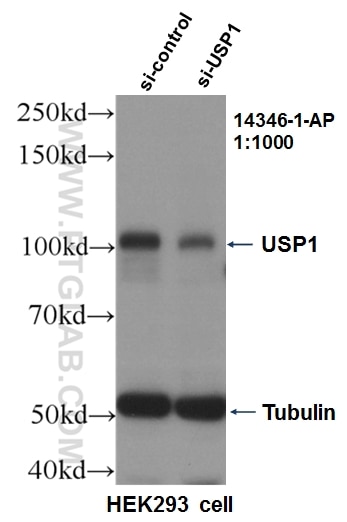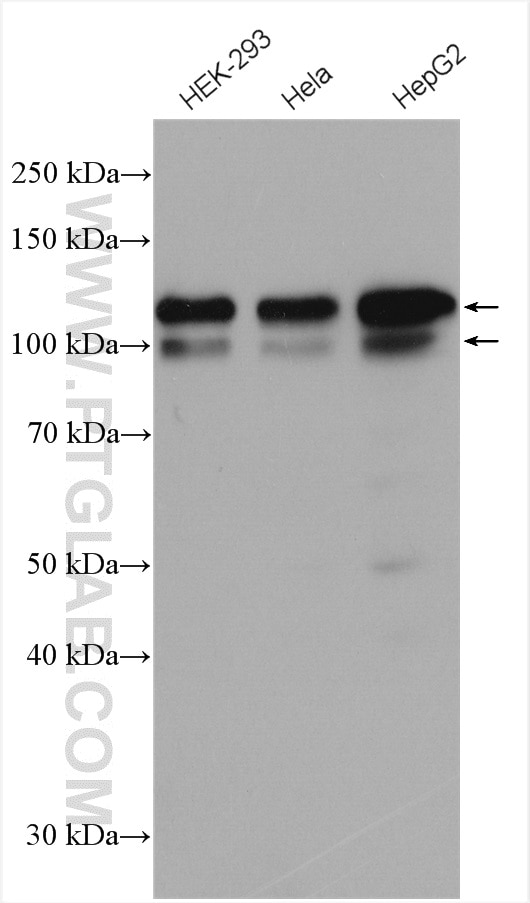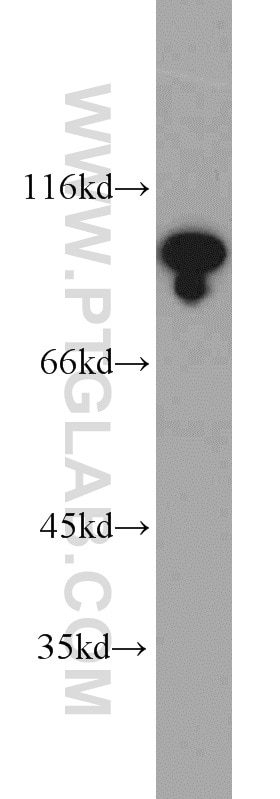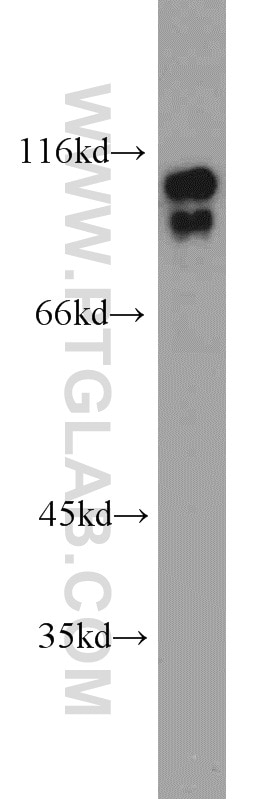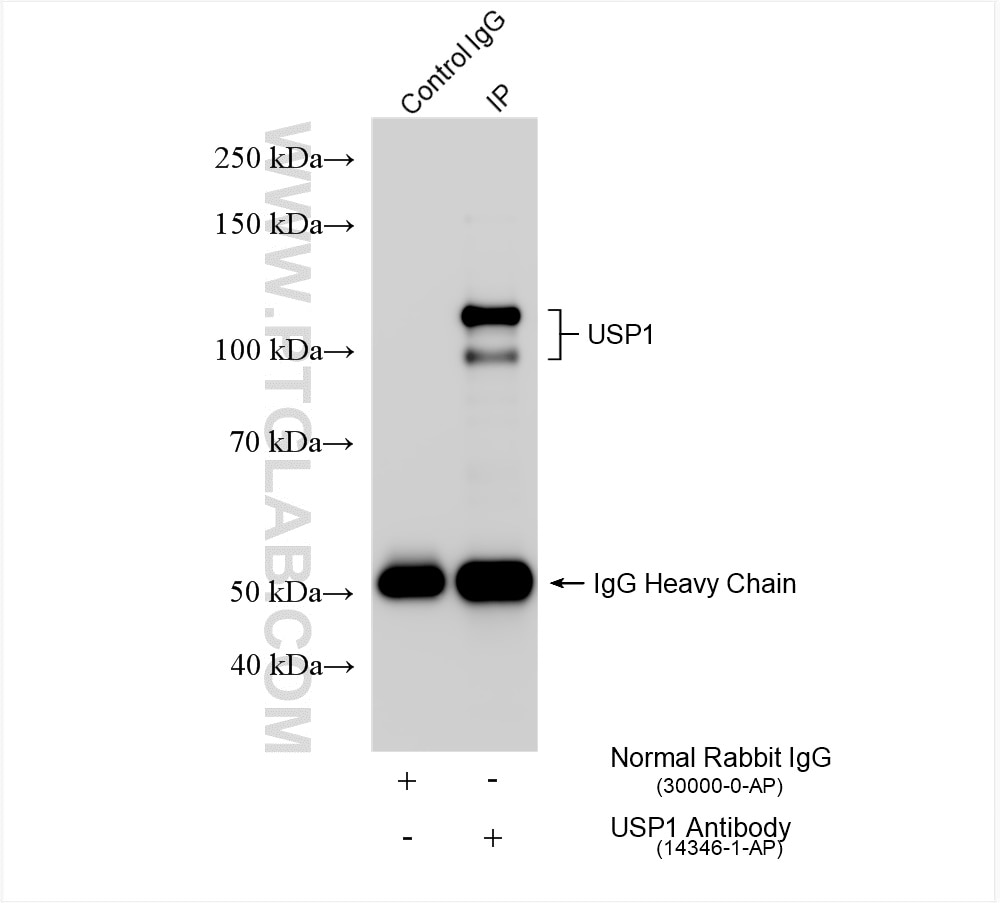- Phare
- Validé par KD/KO
Anticorps Polyclonal de lapin anti-USP1
USP1 Polyclonal Antibody for WB, IP, ELISA
Hôte / Isotype
Lapin / IgG
Réactivité testée
Humain et plus (2)
Applications
WB, IHC, IF, IP, CoIP, ELISA
Conjugaison
Non conjugué
N° de cat : 14346-1-AP
Synonymes
Galerie de données de validation
Applications testées
| Résultats positifs en WB | cellules HEK-293, cellules HeLa, cellules HepG2 |
| Résultats positifs en IP | cellules HEK-293, |
Dilution recommandée
| Application | Dilution |
|---|---|
| Western Blot (WB) | WB : 1:500-1:1000 |
| Immunoprécipitation (IP) | IP : 0.5-4.0 ug for 1.0-3.0 mg of total protein lysate |
| It is recommended that this reagent should be titrated in each testing system to obtain optimal results. | |
| Sample-dependent, check data in validation data gallery | |
Applications publiées
| KD/KO | See 11 publications below |
| WB | See 34 publications below |
| IHC | See 11 publications below |
| IF | See 8 publications below |
| IP | See 8 publications below |
| CoIP | See 2 publications below |
Informations sur le produit
14346-1-AP cible USP1 dans les applications de WB, IHC, IF, IP, CoIP, ELISA et montre une réactivité avec des échantillons Humain
| Réactivité | Humain |
| Réactivité citée | rat, Humain, souris |
| Hôte / Isotype | Lapin / IgG |
| Clonalité | Polyclonal |
| Type | Anticorps |
| Immunogène | USP1 Protéine recombinante Ag5686 |
| Nom complet | ubiquitin specific peptidase 1 |
| Masse moléculaire calculée | 88 kDa |
| Poids moléculaire observé | 110 kDa, 100 kDa |
| Numéro d’acquisition GenBank | BC050525 |
| Symbole du gène | USP1 |
| Identification du gène (NCBI) | 7398 |
| Conjugaison | Non conjugué |
| Forme | Liquide |
| Méthode de purification | Purification par affinité contre l'antigène |
| Tampon de stockage | PBS with 0.02% sodium azide and 50% glycerol |
| Conditions de stockage | Stocker à -20°C. Stable pendant un an après l'expédition. L'aliquotage n'est pas nécessaire pour le stockage à -20oC Les 20ul contiennent 0,1% de BSA. |
Informations générales
USP1(Ubiquitin carboxyl-terminal hydrolase 1) is a negative regulator of DNA damage repair which specifically deubiquitinates monoubiquitinated FANCD2. It is also involved in PCNA-mediated translesion synthesis (TLS) by deubiquitinating monoubiquitinated PCNA. This protein, which consists of 785 amino acids with a deduced molecular mass of 88.2 kDa, possesses His and Cys domains that are highly conserved in all members of the ubiquitin-specific processing (UBP) family of proteases (PMID: 9806842). The USP1 enzyme can undergo autocleavage, resulting in a 100 kDa N-terminal fragment and a 14 kDa C-terminal fragment (PMID: 18082604).
Protocole
| Product Specific Protocols | |
|---|---|
| WB protocol for USP1 antibody 14346-1-AP | Download protocol |
| IP protocol for USP1 antibody 14346-1-AP | Download protocol |
| Standard Protocols | |
|---|---|
| Click here to view our Standard Protocols |
Publications
| Species | Application | Title |
|---|---|---|
Nat Chem Biol A selective USP1-UAF1 inhibitor links deubiquitination to DNA damage responses. | ||
Mol Cell Polyubiquitinated PCNA recruits the ZRANB3 translocase to maintain genomic integrity after replication stress. | ||
Nat Commun The anaphase promoting complex impacts repair choice by protecting ubiquitin signalling at DNA damage sites. | ||
Nat Commun hnRNP H/F drive RNA G-quadruplex-mediated translation linked to genomic instability and therapy resistance in glioblastoma. | ||
Theranostics CRISPR/Cas9-based genome-wide screening for deubiquitinase subfamily identifies USP1 regulating MAST1-driven cisplatin-resistance in cancer cells |
